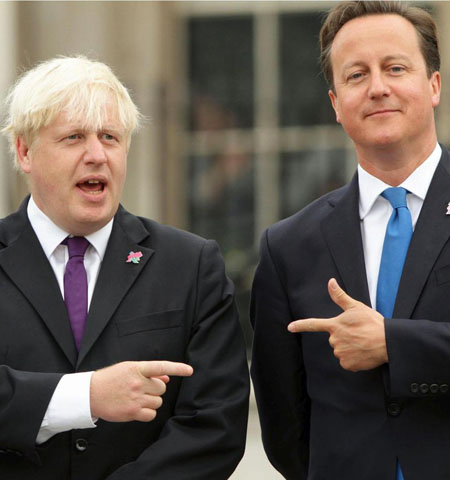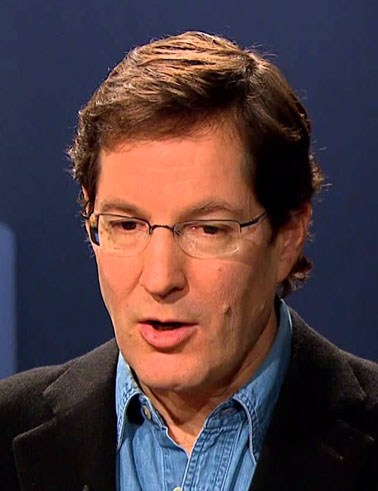Happy Canada Day 2016 – for Canadians biggest Brexit impact may be Canadexit from King Charles III
Jun 30th, 2016 | By Counterweights Editors | Category: Canadian Republic

“Two time Bond girl Valerie Leon reckons 007 would be tempted to vote in favour of leaving the EU in this month’s referendum.”
TORONTO, CANADA. JUNE 30, 2016. Our local and regional stock markets are back, Â and it is starting to seem that the Brexit crisis in the United Kingdom is not going to precipitate a global depression after all.
It does nonetheless remain something of a bigger-than-expected political (and no doubt economic) disturbance in the UK itself.
(And George Soros has perhaps wisely enough “urged members of the European Parliament … Â to ‘drastically reshape’ fiscal policy across the region in the wake of Great Britain’s vote to exit the European Union.”)
Who knows just how well the current generation of the  political class that once built the greatest empire since Rome in a fit of absence of mind will rise to the not exactly expected challenges?
Already, however, such present-day instruments of an esteemed old intellectual tradition as the London Review of Books blog are showing evidence that whatever the politicians may finally do will at least be accompanied by a lot of highly literate and even amusing written commentary.
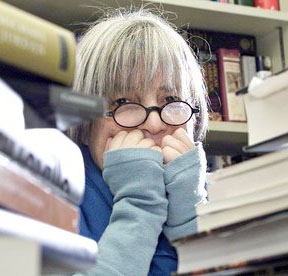
“The London Review of Books' co-founder and editor, Mary-Kay Wilmers. Photograph: Graham Turner for the Guardian.”
We submit two pairs of recent LRB blog postings as cases in point.
(1) David Runciman
The first pair are from David Runciman, a contemporary English aristocrat (born 1967 as “heir to his family’s Viscountcy”), educated at Eton College and Cambridge University, and currently “Head of the Department of Politics and International Studies” at Cambridge.
Professor Runciman’s two postings are “Why did he do it?” (24 June 2016) and “Slow Motion Disintegration” (28 June 2016).
You might think that these titles refer to UK Prime Minister David Cameron’s now clearly mistaken decision to hold a referendum on the UK’s future in the European Union in the first place, and the unwinding of his Conservative government once the referendum went against his own advice. And you would probably be half right.

David Runciman, Head of the Department of Politics and International Studies at Cambridge University – and English football fan.
But the titles also clearly refer to the parallel mistakes and unwinding of Roy Hodgson, manager of England’s national team in the Euro 2016 football tournament (or ahem, soccer as we say here in North America) – almost poignantly if accidentally synchronized with the Brexit referendum.
And Runciman seems uncertain at best about which of these two key current disappointments in English history has disturbed him more.
He nonetheless concludes by noting that, although the Euro 2016 football tournament “has thrown up an embarrassment of riches when it comes to analogies between sport and politics,” he can find nothing to “compare with what [opposition leader Jeremy] Corbyn is doing to the Labour Party” in the wake of the Brexit referendum!
(2) Sadakat Kadri
Our second pair of recent LRB blog postings come from Sadakat Kadri, who among other things illustrates how English intellectual life has updated itself to meet various new currents in the wider global village (which all the European empires, starting with Portugal in the late 15th century, helped get started in days now long gone by).
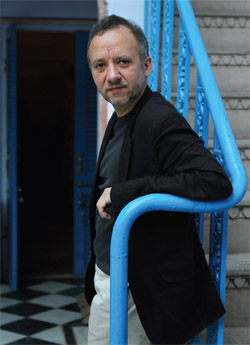
Sadakat Kadri in his native London, England (which decisively voted “Remain” in the Brexit referendum). Photo: Shailendra Pandey.
Kadri was born in London in 1964, to a Finnish mother and Pakistani father. He too studied at Cambridge University – and Harvard Law School. Today he is “a lawyer, author, travel writer and journalist.”
It is also a tribute to something still alive and well in the old metropolis of the empire on which the sun never dared etc that, by all appearances, Sadakat Kadri certainly considers himself a “Westerner” and an Englishman (or Brit or authentic citizen of the UK).
Kadri is more amusing than Runciman as well (to our tastes at any rate), and his two postings for our purposes here are “Back to Europe” (22 June 2016) and “Bullxit” (27 June 2016).
“Back to Europe” was posted the day before the Brexit referendum, and concluded with :
“Brexiteer politicians have not only appealed to nostalgia for a time when old maids drank warm beer as they cycled across misty cricket grounds, but also conjured a dynamic global future: a UK plc, which, freed from the shackles of Brussels, will negotiate brilliant free-trade deals (excluding migrant workers) and re-embrace a grateful Commonwealth. These fantasies are dangerously unrealistic … No one knows what the future holds, and even if we leave, I hope the EU will thrive without us.”
Sadakat Kadri’s second LRB blog posting (“Bullxit”, June 27) was about the man who, in the immediate wake of the Brexit referendum, seemed most likely to succeed David Cameron as Conservative leader and UK prime minister – the former mayor of London and still more former editor of the conservative weekly, The Spectator, Boris Johnson (aka BoJo).
It drew on an article by Johnson himself in the June 26 Telegraph, headlined “I cannot stress too much that Britain is part of Europe – and always will be .”
(3) BoJo rise and fall
As Kadri explained, “almost everyone who knows Johnson attests to his many liberal and Europhiliac instincts.” But then on a day this past “February … Johnson chose to throw in his lot with [Brexit supporter] Michael Gove rather than [Brexit critic] David Cameron.”
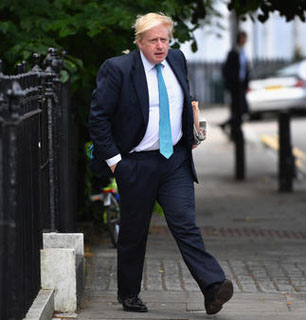
Boris Johnson leaves his home in London on the morning of the day before the Brexit referendum. (Jeff F. Mitchell/Getty Images.)
At this point “a poll gave supporters of the EU a 15 per cent lead. Had Johnson campaigned with less panache, Brexit would probably have fallen short of a majority; and if he had plumped for Remain in the first place, the UK would almost certainly still have a future in the EU.”
When the Leave side unexpectedly won, Johnson was unexpectedly in the position of having to do something more than just criticize Cameron, in a plot to eventually succeed him. In Kadri’s words : “Now that he unexpectedly finds himself at Downing Street’s threshold … he needs to buy time – Â and his meaningless manifesto in the Telegraph is designed to do just that.”
Now, on June 30 – the day before Canada Day on the other side of the ocean – Boris Johnson himself (“born in New York City to upper middle-class English parents” in the same year as Sadakat Kadri) has withdrawn from the race to succeed David Cameron. And if you must know more, consult “How will Boris Johnson’s departure change the Tory leadership contest?”
 We confess we’re disappointed by BoJo’s decision. Sadakat Kadri is probably right that Johnson’s “meaningless manifesto” in the Telegraph would be impossible to implement seriously. But we have to confess that we at least were impressed … Â sort of.
We confess we’re disappointed by BoJo’s decision. Sadakat Kadri is probably right that Johnson’s “meaningless manifesto” in the Telegraph would be impossible to implement seriously. But we have to confess that we at least were impressed … Â sort of.(Put another way, say whatever else you like, Boris Johnson is not really like Donald Trump at all, despite his New York City birthplace.)
As Kadri has explained on this front : “If Johnson has his way, Brexit is going to involve inactivity on an industrial scale. He envisions a ‘balanced and humane points-based’ immigration system, but that’s for the extremely indeterminate future – and everyone can meanwhile look forward to ‘intense and intensifying’ co-operation with Europe, and opportunities to live, travel, work and study on the continent just as they please.”
Kadri goes on, quoting BoJo in the Telegraph at length : “British businesses will enjoy uninterrupted ‘access to the single market’. The only apparent change, which will happen ‘in no great rush’, will be the UK’s ‘extrication’ from the European Union’s ‘extraordinary and opaque system of legislation: the vast and growing corpus of law enacted by a European Court of Justice from which there can be no appeal’.”
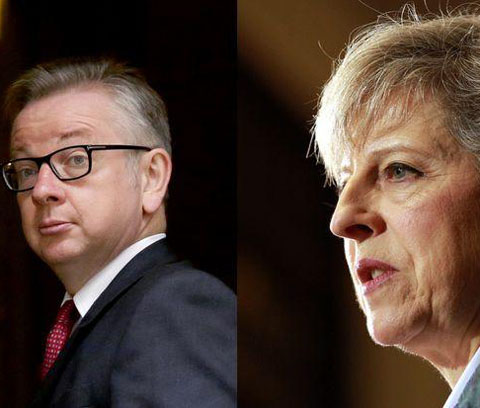
“Michael Gove, Secretary of State for Justice, and Home Secretary Theresa May are in the race for the Conservative Party's leader.” And one of them may win, instead of Boris Johnson. But, just looking at the photos, who seems more interesting : either one of them, or BoJo? We rest our case. (AP and EPA photos, and compliments to the Bangkok Post.)
Again, this almost certainly couldn’t work, as Sadakat Kadri urges. But it made us think that, from the standpoint of the rest of the world, if there was anyone among the current generation of the political class that once built the greatest empire since Rome who could make some realistic and forward-looking sense of the June 23 UK referendum result, it probably was Boris Johnson.
Now that he has bowed out of the race, the challenges that the Brexit referendum no doubt does all too suddenly present to the United Kingdom (and/or the EU) seem to be a matter for those who live in those places alone. That at least is how it looks to us … right now … far, far away …
(4) Happy Canada Day 2016 … and happy Canadexit …
With Canada Day just around the corner tomorrow, as well, we have finally been most especially impressed by two Canadian articles on the implications of Brexit for Canada.
The first is from journalist Martin Regg Cohn, and it appeared in the Toronto Star last weekend : “From Brexit to Canadexit, cutting the ties that bind… How much longer until we sever our last links to Mother England – colonial and constitutional?”
Mr. Cohn concludes with : “As our 150th birthday approaches, and as Canadians ponder the arrival of King Charles III and Camilla, the conversation about cutting the ties that bind is just beginning.”
Some of us have been trying to have this conversation for a number of years now already. But Mr. Cohn is probably (and certainly hopefully) onto something, when he suggests that the Brexit referendum in the UK – and the growing imminence of a King Charles III (and remember Charles I was beheaded by Parliament) – has given the debate a life it didn’t have before.
(And we also think the “Canadexit” concept deserves to have a life beyond Mr. Cohn’s column, the week before Canada Day 2016!)
As if to underline and certainly echo the argument Martin Regg Cohn was making in the Toronto Star on June 25, on June 28, 2016 thewalrus.ca posted a piece by the Toronto novelist and culture columnist for Esquire magazine, Stephen Marche. It was called “Parting Ways with the Queen … Why the time has come for Canada to abandon England altogether.”
“After Brexit,” Mr. Marche declares, the “moment for Canada to find its own head of state has arrived … Once upon a time, there were good reasons to have the Queen as our head of state, all of which have now evaporated.”
He goes on :”I know that even the idea of starting to discuss the Canadian constitution is enough to make reasonable people in this country throw up in their mouths a little bit. But surely a Canada in which English- and French-speaking Canadians live together cannot be injured by separating itself, permanently, from the principal architects of the Conquest … Seventy-one percent of Quebecers support abandoning the monarchy. English Canada is just catching up.”
Stephen Marche concludes with : “Support for the monarchy has been steadily declining in Canada as our demography has changed.” In a poll last year :”Seventy-three percent wanted a head of state born in Canada. Those numbers are only going to go one way, as Canada continues to define itself as multicultural and England defines itself as English … The truth is that we have already parted ways … It’s long since time to make the break official.”
And with that we say Happy Canada Day 2016 – and three cheers for Canadexit!
